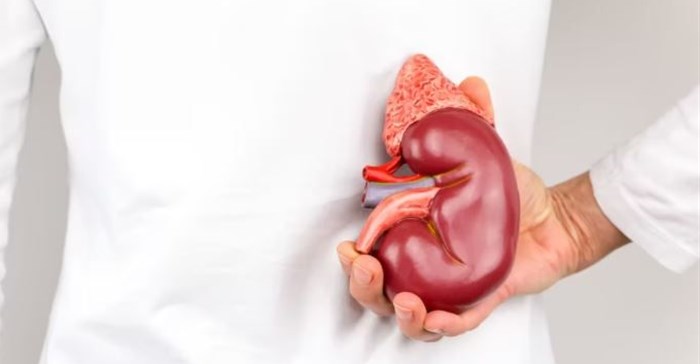Covid-19 targets kidneys, study finds...

This was a recent statement by Dr Bha Ndungane-Tlakula, country medical director at Pfizer, who is passionate about discussing the fundamentals of kidney health.
She was speaking out for patients with severe cases of Covid-19, more of whom are showing signs of kidney damage, even those who have had no previous problems with their kidneys before they contracted the disease.
Signs of kidney problems in patients with Covid-19 include high levels of protein in the urine and abnormal blood work, according to John Sperati, an expert in kidney health at Johns Hopkins University School of Medicine.
The kidney damage is, in some cases, severe enough to require dialysis, he said.
The vital role of kidneys
"The health of our kidneys is paramount as they filter out toxins in our bodies, produce essential chemicals, and break down harmful chemicals, excreting two litres of waste every day," Tlakula states. “Many people whose kidneys are diseased do not develop symptoms until their kidneys are close to failing; therefore, early detection of dysfunction is crucial.”
Covid-19 further complicates this scenario as Sperati and other doctors are also seeing kidney damage in people who did not have kidney problems before they got infected with the virus. The impact of Covid-19 on the kidneys isn’t yet clear, but some possibilities Sperati is exploring are that coronavirus might target kidney cells.
"This is because kidney cells have receptors that enable the new coronavirus to attach to them, invade, and make copies of itself, potentially damaging those tissues. The other possibility is that Covid-19 causes blood clots that might clog the kidneys thereby impairing their function," he said.
SA's rising numbers
Approximately 15% of the South African population has Chronic Kidney Disease (CKD), with 20,000 new cases every year, according to the National Kidney Foundation of South Africa. Kidney failure in South African adults is mainly due to inherited high blood pressure (60-65%) or Type 2 Diabetes (20-25%).
Renal cell carcinoma is the most common type of kidney cancer and accounts for about 90% of all cases.
With Covid-19 now linked in some cases to CKD too, the annual statistics are very likely still conservative in South Africa.
In May last year, a US study cited that kidney injury was seen in more than a third of hospitalised Covid-19 patients. The study was conducted by a team at Northwell Health, the largest health provider in New York state, and the results released here.
"Of the 5,449 patients, 36.6% of them developed acute renal failure or kidney injury. Of the ones that got kidney injury, 14% required dialysis," said study co-author Dr. Kenar Jhaveri, associate chief of nephrology at Hofstra/Northwell in Great Neck, New York, whose findings were published in the journal 'Kidney International'.
As of yet it’s uncertain how many people with Covid-19-related kidney damage regain their kidney function.
Sperati says, “Patients with acute kidney injury due to Covid-19 who do not require dialysis will have better outcomes than those who need dialysis, and we have seen patients at Johns Hopkins who recover kidney function. We have even had patients in the ICU with acute kidney injury who have required dialysis, and subsequently regained their kidney function. How often that occurs is still not known, but without question, the need for dialysis is a worrisome development in patients with Covid-19.”
Laying down the groundwork
"The importance of keeping our kidneys healthy cannot be overstated; therefore, it is essential to highlight the importance of kidney health and detecting kidney disease early," Tlakula said.
"Smoking tobacco and excessive alcohol consumption have been linked to a higher risk of developing kidney cancer. Hypertension or high blood pressure is another important factor to consider, particularly in men, as is obesity.
“The optimal way to care for the kidneys is by controlling our blood pressure through a healthy diet, low salt intake, regular exercise, quitting smoking, managing diabetes effectively, and staying hydrated with water, not sugary drinks or alcohol,” says Tlakula. "Also, avoid taking medications such as NSAIDs (Non-Steroidal Anti Inflammatory), which can harm the kidneys if taken in excess.
"It is important for South Africans to improve their habits and to be aware of the risk factors to reduce the chance of developing the disease or to diagnose it early before it has spread."
About Katja Hamilton
- Can the UN impose sanctions on SA? You bet it can… and One Health may be the tipping point - 15 Mar 2024
- Unveiling the heroes: A look behind the scenes of integrating palliative care into SA's public health system - 14 Mar 2024
- South Korea: Junior doctors strike amid concerns over low doctor-to-patient ratio - 4 Mar 2024
- US-China talks: The fate of fentanyl manufacturing hangs in the balance - 30 Jan 2024
- #WEF24: Israeli president addresses dire health of Hamas-held hostages - 22 Jan 2024
View my profile and articles...

